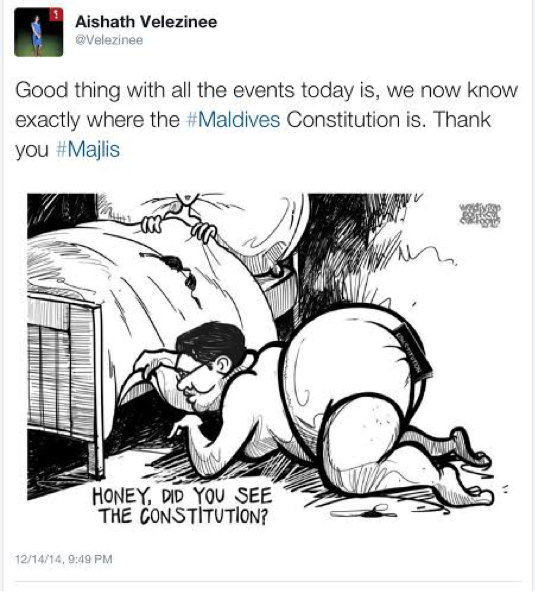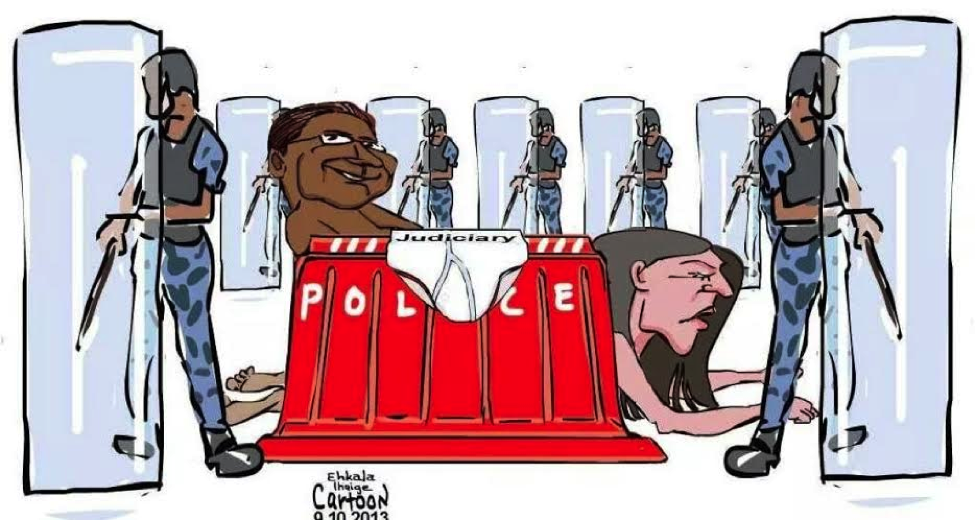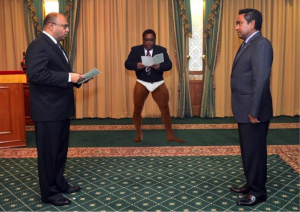Mutiny of the State: Maldives gets away with another coup d’état

by Aishath Velezinee
A year ago the Supreme Court of the Maldives reigned supreme. The court, and at times the Chief Justice alone, ran wild with “the powers of the Supreme Court” citing Article 145 (c) for Supreme Court interference in all manner of issues. Article 268 on supremacy of the Constitution binds the Supreme Court too. But both the Supreme Court and Parliament majority were willfully blind to this as they got their way, citing the Constitution to justify outrageous breaches of the Constitution.
Few among the general public in a polity with a history of authoritarian rule and unfamiliar with the concept of the rule of law understood contraventions of the Constitution, especially when the breaches were blatantly defended by the Supreme Court. In the absence of a culture of democracy it was often reduced to whatever the “majority” decided, by hook or by crook. To win was the ultimate goal in elections as well as in litigation, no matter how. Reason by the minority was drowned out and, with the Supreme Court politicised and the Parliament majority with the President, an Executive dictatorship reigned in the shadow of the supreme Supreme Court.
The gravity of the situation became visible to the public and the international community during the 2013 presidential elections, when the Supreme Court repeatedly intervened in the election process, often working the graveyard shift and issuing midnight decrees and directives to control the elections. Polls were nullified and voting was repeatedly rescheduled to ensure an election win for Abdulla Yameen Abdul Gayoom, half-brother of the 30-year dictator Maumoon Abdul Gayoom. Why the Supreme Court may have had an interest in seeing Yameen as the president may be seen in Yameen’s statement to the Commission of National Inquiry (CoNI) that decided the 7 February 2012 coup was not a coup
Soon after the presidential elections, the Supreme Court also facilitated a win for President Yameen’s Progressive Party of Maldives (PPM) in parliamentary elections, removing the Elections Commissioner and his deputy in the first suo moto case, suo moto vs Elections Commission of Maldives. The Elections Commissioner was accused of contempt of the Court and undermining the powers of the Supreme Court.
During the election campaign President Yameen, like PPM MPs in their campaigns, pledged to protect the judiciary from interference, condemning the local and international calls for judicial reform as “interference in the judiciary”. The Supreme Court is the highest authority, the bearer of the last word in all matters of law, and none had the power to criticize or demand reform of the judiciary, both the Supreme Court and President Yameen agreed.
Dismissive of all expert reports on the Maldives judiciary, the Supreme Court adopted contempt of court regulations to prohibit media and public criticism and went as far as to initiate court action against the Human Rights Commission of the Maldives (HRCM) in suo moto vs HRCM, charging all members of the HRCM with high treason for their 2014 report to the Universal Periodic Review (UPR) for noting Supreme Court unduly influences and controls the judiciary.
Chief Justice Ahmed Faiz Hussain played his cards to win. From giving oath to Vice President Dr. Mohamed Waheed Hassan Manik without question and legitimising the 7 February 2012 coup d’état to guaranteeing a win for coup-leader Yameen in the 2013 elections, facilitating a PPM majority in Parliament and remaining silent while PPM majority systematically undermined the Constitution and ruled by law instead of upholding the rule of law, Faiz never faltered.
None of these mattered when on Monday, 14 December 2014 when, following an amendment to the Judicature Act which required the Supreme Court bench to be reduced from seven to five justices, the PPM majority in Parliament removed from the bench Chief Justice Faiz and Justice Muthasim Adnan—the only voice of reason, and often only voice of dissent from majority opinion in the court.

Supreme Court Justice and Chief of the Interim Supreme Court Abdulla Saeed who I maintain engineered hijacking of the judiciary in 2010 in what I have since called the silent coup, was rewarded with the title of Chief Justice. Solemnising the historic oath of the new Chief Justice was none other than Supreme Court Justice Ali Hameed whose white underpants made international headlines after the Court ruled against display of white underpants in public protests. The white pants became a protest prop against Justice Ali Hameed after videos of the judge with foreign sex workers in a hotel in Colombo, Sri Lanka, went viral on the internet.
The Final Nail in the Coffin
Amendments to the Judicature Act were passed by the Parliament majority on Wednesday and ratified by President Yameen on Thursday.
Under the new amendments two judges were to be removed from the Supreme Court to reduce the bench from seven to five Justices; and the High Court bench is to be chopped in three equal parts, with three of the nine justices assigned to three geographical regions. A total of 43 MPs voted for the change, all members of PPM the government majority, and errant members of the opposition.
Within hours of ratification, the Judicial Service Commission (JSC) who had staunchly refused to assess or remove a single judge as required for the de facto transition under Constitution Article 285, announced a decision to submit names of Chief Justice Ahmed Faiz Hussain and Justice Muthasim Adnan for removal. No reasons were given as to why or how the JSC reached the decision to remove them. The media was simply told it was a secret decision and that the Commission had decided not to reveal procedure or reason.
On Saturday, while the opposition, senior lawyers, commentators, media, social media activists, CSOs, the public and even the Civil Court declared the amendments to the Judicature Act unconstitutional and illegitimate, politicians “bargained” to win the two-third simple majority required to remove a judge.
On Sunday, the State worked overtime. Sunday morning, while opposition-led protests were kept at a distance by Police barricades around the Parliament building, government MPs with Parliament majority voted to remove Chief Justice Ahmed Faiz Hussain and Justice Muthasim Adnan. MDP issued a three-line whip to reject the dismissal of the justices but with at least five opposition MPs making themselves absent from the proceedings, the required two-third simple majority vote was guaranteed. MDP MPs and some JP MPs raised the matter of the unconstitutionality of the amendment to judicature Act—the fact is that Article 154 of the Constitution, under which the Majlis had scheduled to remove the justices, does not permit the removal of a judge except where the Judicial Service Commission finds the person grossly incompetent, or guilty of gross misconduct. MPs also noted no such report from the JSC regarding the two judges who were to be removed had been made available to them nor was it on record with the Parliament. It was noted that the only documentation before Parliament was a three-line note from the JSC seeking the removal of Chief Justice Ahmed Faiz Hussain and Justice Muthasim Adanan, and that this was forced upon the JSC by the Parliament with the unconstitutional amendment to the Judicature Act.
Parliament majority leader of PPM spoke for the government, laughing at opposition claims of unconstitutionality, and citing Constitution Article 70 and the powers of the Parliament therein to, in his interpretation, “make any law on any matter and any manner, whenever and wherever Parliament wish”! That there were limits upon the Parliament, and that the Parliament may not enact a law detrimental to the Constitution was lost upon him.
 The vote was won and, Sunday afternoon, it was reported that JSC had proposed Supreme Court Justice Abdulla Saeed for the post of Chief Justice. Sunday evening, Parliament was back in session and Abdulla Saeed was appointed the new Chief Justice with 55 votes. Before midnight, Abdulla Saeed had taken oath.
The vote was won and, Sunday afternoon, it was reported that JSC had proposed Supreme Court Justice Abdulla Saeed for the post of Chief Justice. Sunday evening, Parliament was back in session and Abdulla Saeed was appointed the new Chief Justice with 55 votes. Before midnight, Abdulla Saeed had taken oath.
Amendment to the Judicature Act, execution of amendment on Supreme Court with the dismissal of Chief Justice and another Supreme Court justice, and appointment of a new Chief Justice, was all over before Monday morning, the earliest when the international community could possibly react.
Corrupting of the Judiciary
In 2010, the JSC, supported by then opposition Parliament majority, refused to execute Article 285, and re-appointed all sitting judges en masse. Further, both JSC and opposition MPs misled the public on JSC’s actions leading up to the collective judges’ oath on 4 August 2010, making false claims on the “procedure” as well as the discussions in the closed sittings of the Commission.
The JSC published what it called the “legal reasoning on the Article 285 decision” speaking of the “human rights of judges” and citing Constitution section 51 (h) and ICCPR Article 14:2 and UDHR Article 11 on rights of the accused, to explain why no sitting judge may be removed for misconduct or failing to be of good character. “No one can be penalized (dismissed) by a retrospective law,” JSC claimed in 2010, the “law” referred to here by the JSC being the Constitution (2008).
The JSC’s decision stood as few protested against it, and complaints to Parliament oversight Committee, the Anti Corruption Commission and the Human Rights Commission on JSC’s treason were ignored or covered up.
The appointment of the Supreme Court too was a political decision influenced by the existing power balance in the Parliament, and the pressure from the international community for “political negotiation and peace”.
Reports of the International Commission of Jurists who probed the issue following appeals in 2010 and the UN Special Rapporteur on Independence of Lawyers and Judges and FIDH who made inquiries after the February 2012 coup d’état all recognise fundamental mis-conceptualizations in appointment of judges and in the use of concepts like independence of the judiciary and the rule of law in the Maldives.
Rule By Law: Precedents in the Maldives
Removal of Chief Justice Ahmed Faiz Hussain and Justice Muthasim Adnan from the Supreme Court bench through amendment legislation is not a first breach. A number of similar unconstitutional actions where political “majority” power reigned supreme have set the precedent. Some major comparable instances are found in the following:
- Removal of the Chair of the Judicial Service Commission (JSC), High Court Chief Justice Abdul Ghani Mohamed from the JSC through a High Court decree on 21 January 2010. The decision was taken by three of the five High Court Justices while the fourth was on leave, and, without the knowledge of Abdul Ghani himself. The move contravened democratic principles. The JSC did not investigate the misconduct and abuse of power by the three High Court Judges despite the adoption of a motion to do so, and appointed two of the said three High Court justices to the Supreme Court and appointed the third as Chief Justice of the High Court.
- The legitimisation of JSC’s breach of Constitution Article 285 by the Judicature Act of 10 August 2010 which brought down the standards and qualifications stipulated in the Constitution for judges.
- The amendment to the Judicature Act on 10 August 2010, the same day it was passed and ratified, to qualify Dr. Ahmed Abdulla Didi for the Supreme Court bench.
- The amendment to the Judges Act to reward removed Justice Mujthaaz Fahmy with a hefty pension and other privileges.
- The legitimisation of the 7 February 2012 coup d’état by majority power in Parliament.
- The removal of the Auditor General through amendment to the Auditor General’s Act in 2014.
Another coup d’état?
If a coup d’état is understood as hijacking of State powers, and bringing down of legitimate Constitutional government, and/or the derailment of Constitutional government, the Maldives has once again carried out a coup d’état, this time going full circle to complete what I have called earlier the silent coup.
With Monday’s move all State powers are once again with the President who has got himself Parliament majority with the power to write and rewrite law; and the shamelessness to do so without regard to the Constitution, democratic principles, public outrage or international criticism.
With the Supreme Court secured, Parliament is now on fast track, undoing the Constitutional rights and safeguards. Next step will be the elimination of all opposition including independent voices, all by Court order and verdicts, once again by the powers of the Constitution. Where do the people of Maldives go with this case of the mutiny of the state against its’ own Constitution and people?
Author’s Note: All illustrations and photos used in the article are taken from the public response to the issue on social media